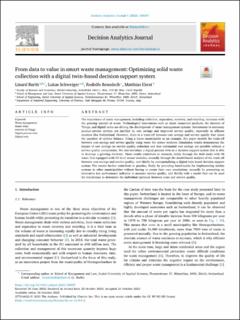Please use this identifier to cite or link to this item:
https://doi.org/10.21256/zhaw-30027Full metadata record
| DC Field | Value | Language |
|---|---|---|
| dc.contributor.author | Barth, Linard | - |
| dc.contributor.author | Schweiger, Lukas | - |
| dc.contributor.author | Benedech, Rodolfo Andres | - |
| dc.contributor.author | Ehrat, Matthias | - |
| dc.date.accessioned | 2024-02-29T13:23:18Z | - |
| dc.date.available | 2024-02-29T13:23:18Z | - |
| dc.date.issued | 2023-10-28 | - |
| dc.identifier.issn | 2772-6622 | de_CH |
| dc.identifier.uri | https://digitalcollection.zhaw.ch/handle/11475/30027 | - |
| dc.description.abstract | The importance of waste management, including collection, separation, recovery, and recycling, increases with the growing amount of waste. Technological innovations such as smart connected products, the Internet of Things, and digital twins are driving the development of smart management systems. Investments in necessary product-service systems are justified by cost savings and improved service quality, especially in affluent societies like Switzerland. However, there is a trade-off between cost savings and service quality that raises the question of optimal balance. Using a Swiss municipality as an example, this paper models the trade-off between cost savings and service quality using waste bin sensor modules. Simulation results demonstrate the impact of cost savings on service quality reduction and that substantial cost savings are possible without a service quality compromise. We also introduce a digital process twin as a decision support system that is able to leverage a growing database. These results contribute to research, firstly through the field study with 98 waste bins equipped with fill level sensor modules, secondly through the model-based analysis of the trade-off between cost savings and service quality, and thirdly by conceptualizing a digital twin-based decision support system. The results further contribute to practice, firstly by providing benchmarks for implementing similar systems in other municipalities without having to create their own simulations, secondly by presenting an innovative key performance indicator to measure service quality, and thirdly with a model that can be used for simulations to determine the individual optimum between costs and service quality. | de_CH |
| dc.language.iso | en | de_CH |
| dc.publisher | Elsevier | de_CH |
| dc.relation.ispartof | Decision Analytics Journal | de_CH |
| dc.rights | https://creativecommons.org/licenses/by-nc-nd/4.0/ | de_CH |
| dc.subject | Waste management | de_CH |
| dc.subject | Smart city | de_CH |
| dc.subject | Internet of Things | de_CH |
| dc.subject | Digital process twin | de_CH |
| dc.subject | Digital twin | de_CH |
| dc.subject.ddc | 363: Umwelt- und Sicherheitsprobleme | de_CH |
| dc.title | From data to value in smart waste management : optimizing solid waste collection with a digital twin-based decision support system | de_CH |
| dc.type | Beitrag in wissenschaftlicher Zeitschrift | de_CH |
| dcterms.type | Text | de_CH |
| zhaw.departement | School of Engineering | de_CH |
| zhaw.departement | School of Management and Law | de_CH |
| zhaw.organisationalunit | Institut für Datenanalyse und Prozessdesign (IDP) | de_CH |
| zhaw.organisationalunit | Institut für Marketing Management (IMM) | de_CH |
| dc.identifier.doi | 10.1016/j.dajour.2023.100347 | de_CH |
| dc.identifier.doi | 10.21256/zhaw-30027 | - |
| zhaw.funding.eu | No | de_CH |
| zhaw.issue | 100347 | de_CH |
| zhaw.originated.zhaw | Yes | de_CH |
| zhaw.publication.status | publishedVersion | de_CH |
| zhaw.volume | 9 | de_CH |
| zhaw.publication.review | Peer review (Publikation) | de_CH |
| zhaw.author.additional | No | de_CH |
| zhaw.display.portrait | Yes | de_CH |
| Appears in collections: | Publikationen School of Management and Law | |
Files in This Item:
| File | Description | Size | Format | |
|---|---|---|---|---|
| 2023_Barth-etal_Digital-twin-based-decision-support-system-solid-waste-collection.pdf | 3.73 MB | Adobe PDF |  View/Open |
Show simple item record
Barth, L., Schweiger, L., Benedech, R. A., & Ehrat, M. (2023). From data to value in smart waste management : optimizing solid waste collection with a digital twin-based decision support system. Decision Analytics Journal, 9(100347). https://doi.org/10.1016/j.dajour.2023.100347
Barth, L. et al. (2023) ‘From data to value in smart waste management : optimizing solid waste collection with a digital twin-based decision support system’, Decision Analytics Journal, 9(100347). Available at: https://doi.org/10.1016/j.dajour.2023.100347.
L. Barth, L. Schweiger, R. A. Benedech, and M. Ehrat, “From data to value in smart waste management : optimizing solid waste collection with a digital twin-based decision support system,” Decision Analytics Journal, vol. 9, no. 100347, Oct. 2023, doi: 10.1016/j.dajour.2023.100347.
BARTH, Linard, Lukas SCHWEIGER, Rodolfo Andres BENEDECH und Matthias EHRAT, 2023. From data to value in smart waste management : optimizing solid waste collection with a digital twin-based decision support system. Decision Analytics Journal. 28 Oktober 2023. Bd. 9, Nr. 100347. DOI 10.1016/j.dajour.2023.100347
Barth, Linard, Lukas Schweiger, Rodolfo Andres Benedech, and Matthias Ehrat. 2023. “From Data to Value in Smart Waste Management : Optimizing Solid Waste Collection with a Digital Twin-Based Decision Support System.” Decision Analytics Journal 9 (100347). https://doi.org/10.1016/j.dajour.2023.100347.
Barth, Linard, et al. “From Data to Value in Smart Waste Management : Optimizing Solid Waste Collection with a Digital Twin-Based Decision Support System.” Decision Analytics Journal, vol. 9, no. 100347, Oct. 2023, https://doi.org/10.1016/j.dajour.2023.100347.
Items in DSpace are protected by copyright, with all rights reserved, unless otherwise indicated.